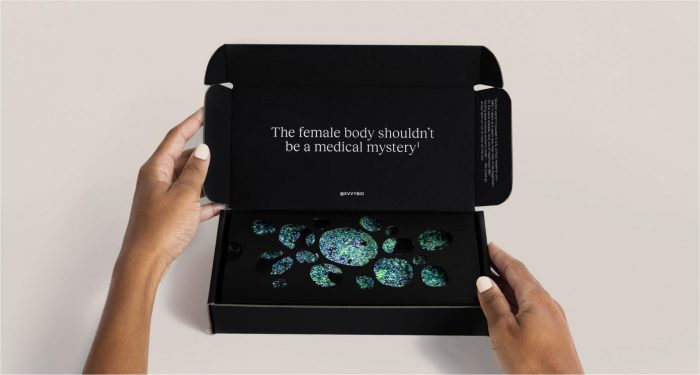More than 50% of women will experience at least one urinary tract infection (UTI) in their lifetime, according to a study highlighted by Evvy. Evvy co-founder and Chief Marketing Officer Laine Bruzek would like to totally transform the way the world views vaginal health and the many myths attached to infections like bacterial vaginosis, yeast infections, and UTIs.

“Recurrent UTIs can happen for many reasons,” Bruzek says. “And for some people with vaginas, it’s because disruptive bacteria have made a home in your vaginal microbiome and they’re consistently traveling to your urethra.”
While the vaginal microbiome contains many protective bacteria, it can easily get thrown off by pathogens like E. coli. Evvy reports that E. coli is the culprit for 80% to 90% of UTIs in cisgender women.
“You’re not dirty, you don’t need to be ashamed of it, just because you get UTIs after sex,” Bruzek explains. “It doesn’t mean there’s anything wrong with you! Part of destigmatizing UTIs is realizing that they can’t always be controlled by your behavior and that there’s a lot of factors at play, including your vaginal microbiome.”
Through Evvy’s at-home vaginal microbiome test, users can get results on all bacteria and fungi present in their vaginas.
Bruzek says she’s excited that Evvy can give people a new avenue to understand how their vaginal microbiome might be creating a favorable environment for UTIs. “Or if your vaginal microbiome looks great,” Bruzek says, “then it can help you rule it out as something that could be contributing to your recurrent UTIs.”
Evvy’s Educational Platform Explains the Why Behind UTI

Through Evvy’s educational platform called #AskEvvy, not only does Bruzek aim to destigmatize UTIs but she also hopes to empower women and those with vaginas with scientifically-sound vaginal health education.
“Microbiomes are scientifically complicated — which means there’s a little bit of a barrier to entry when it comes to understanding your vaginal health,” Bruzek says of their educational efforts. “With #AskEvvy, we’re constantly asking ourselves: what’s the easiest way to explain something as complex as a microbiome? But, on the flip side, I’ve been pleasantly surprised at how [quick] and easy it has been to connect over common problems that anyone with a vagina has experienced, like abnormal discharge or mystery symptoms. We’ve all been there!”
Bruzek thought such topics, including bacterial vaginosis, yeast infections, and UTIs, would be seen as taboo but she says she and the Evvy team have been pleasantly surprised by the response from the community.
“I thought that people weren’t going to want to talk about it, and it was going to be difficult to get the message out about destigmatizing vaginal health,” Bruzek says. “I have been thrilled with how well those messages have reached our community and how many people have told us they no longer feel alone. That’s been one of the most rewarding things about building Evvy so far.”
Evvy Offers Answers To Vaginal Health Woes

When it comes to dispelling UTI myths, Bruzek says she and Evvy’s research team feel there’s a simple solution: better education.
“Meet learners at their level,” Bruzek says. “And treat women like they’re smart! Don’t dumb it down, but don’t talk above their head. Our members are the experts on their own bodies. In short, truly engaging education meets you exactly where you are — and that means you have to make sure that you catch them at the right time and headspace. That obviously takes more thought than just putting out another blog post.”
For those with recurring vaginal symptoms, the team at Evvy recommends testing the vaginal microbiome regularly to unlock answers about how treatments, hormonal changes, and behaviors could be contributing to changes in the microbiome. Vaginal douching, menopause and contraception could also be causing issues.
Bruzek herself experienced firsthand the frustrating cycle of recurrent vaginal infections. She and Evvy co-founder Priyanka Jain say they remain determined to find real solutions for women for this commonly diagnosed yet frequently misunderstood problem.
“A lot of our members test over time because they want to see if particular treatments like boric acid or probiotics are changing their microbiome,” Bruzek says. “You can see if you’ve made a lifestyle change, a diet change, or any sort of behavioral change and if that has impacted your vaginal microbiome. And one of the main benefits of that is that you can stop spending money on treatments that don’t work!”










